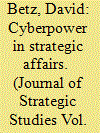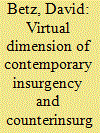| Srl | Item |
| 1 |
ID:
072376


|
|
|
|
|
| Publication |
London, Frank Cass Publishers, 2001.
|
| Description |
162p.
|
| Standard Number |
0714651303
|
|
|
|
|
|
|
|
|
|
|
|
Copies: C:1/I:0,R:0,Q:0
Circulation
| Accession# | Call# | Current Location | Status | Policy | Location |
| 051328 | 322.50947/BET 051328 | Main | On Shelf | General | |
|
|
|
|
| 2 |
ID:
106885


|
|
|
|
|
| Publication |
2011.
|
| Summary/Abstract |
The author reflects on our decade long conflict in Afghanistan and identifies what he considers a main contributor to the malaise. He believes it is a failure to communicate: a message of purpose which answers the oft-asked "why are we there?" question amongst Western audiences; a message of resolve on which Afghans can bet their lives that ISAF will remain there until the Taliban is beaten or compelled to reasonable compromise; and, a message of what success will look like which is accompanied by a compelling rationalization of the cost.
|
|
|
|
|
|
|
|
|
|
|
|
|
|
|
|
| 3 |
ID:
115218


|
|
|
|
|
| Publication |
2012.
|
| Summary/Abstract |
This article explores the effect of connectivity on strategic affairs. It argues that the effect on war's character is potentially, although not yet shown in practice, considerably large. Its effect upon the distribution of power among states in the international system is small, contrary to the claims of `cyberwar' alarmists. All told, however, its effect upon strategic affairs is complex. On the one hand, it represents a significant advance in the `complexification' of state strategies, understood in the sense of the production of intended effects. On the other hand, strategists today - still predominantly concerned with the conflicts and confrontations of states and organised military power - are generally missing the power which non-traditional strategic actors, better adapted to the network flows of the information age, are beginning to deploy. These new forms of organization and coercion will challenge the status quo.
|
|
|
|
|
|
|
|
|
|
|
|
|
|
|
|
| 4 |
ID:
090516


|
|
|
|
|
| Publication |
2009.
|
| Summary/Abstract |
Contesting the view that British forces have successfully adapted to the unique challenges posed by the Taliban in Afghanistan, David Betz and Anthony Coumack respond to Theo Farrell and Stuart Gordon's article published in the last issue of the journal. Their pessimistic analysis highlights continuing problems with British strategy and key structural impediments to improvement
|
|
|
|
|
|
|
|
|
|
|
|
|
|
|
|
| 5 |
ID:
079692


|
|
|
| 6 |
ID:
085480


|
|
|
|
|
| Publication |
2008.
|
| Summary/Abstract |
This paper looks at the virtual dimension of contemporary insurgency and counterinsurgency. It argues that the West is faltering in the 'War of Ideas' with global Jihad for the main reason that the messages that we wish to convey lack narrative coherence. This is a result of the fact that we misapprehend the nature of the virtual operational environment whereas our opponents possess an intuitive grasp of it as a result of which their structure and method of operations are better adapted and more effective than our own. There is no reason, beyond inertia, that this should remain the case.
|
|
|
|
|
|
|
|
|
|
|
|
|
|
|
|